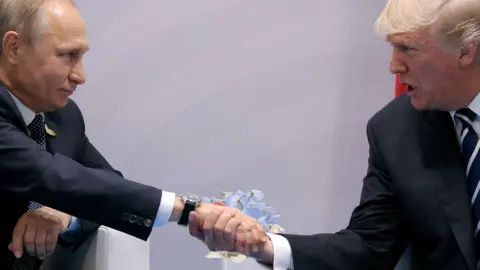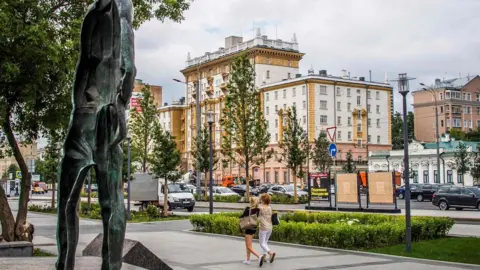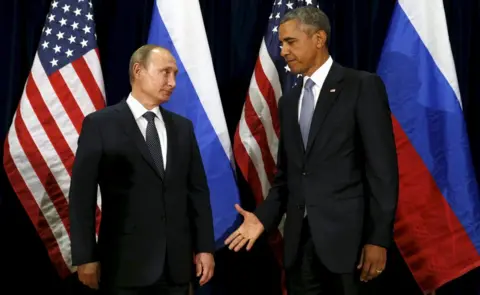US and Russia's diplomatic spat: Carving out an uncertain path

 Reuters
ReutersRussia's decision to significantly reduce the number of US diplomatic staff marks the end of any immediate hope for a fresh start between Moscow and Washington. Indeed, it could usher in a new and uncertain period of competition between the two capitals.
Russia's President Vladimir Putin seized upon US President Donald Trump's election victory as offering the potential for a very different relationship.
Mr Putin appears to have misjudged what was on offer. Relying upon clear signals from the Trump campaign that a reset in the US relationship was both possible and desirable, Moscow intruded into the US campaign to an extent which US intelligence agencies believe was unprecedented.
(Quite how far Russia intruded into the US campaign in actually backing candidate Trump is currently under investigation and this, of course, provides an important element of the backdrop to the worsening diplomatic relationship.)
Russia, of course, denies this but it is clear that they had high hopes of the new political maverick in Washington.
Russia hoped for a change in the climate; one where the lifting of many of the western sanctions imposed after its annexation of Crimea might become possible. But more than this, it wanted a new deal between the US and Russia that would acknowledge Moscow as an equal diplomatic player and indeed as a partner in trouble spots, such as Syria, and in the wider struggle against Islamist terror. These hopes have now come to nothing.
 AFP
AFPRussia seems to have placed unrealistic hopes in what President Trump might achieve. Did Mr Putin see him as a forceful like-minded character, or as a political and diplomatic lightweight that might be manipulated and dominated?
Either way, Russia's own actions in intruding into the US political space and the subsequent investigations have precluded any fresh start. Russia perhaps failed to understand the Congressional hostility to its activities, mistaking the Trump insiders' lack of concern for the predominant view of the president's supporters on Capitol Hill.
So where does this leave things now? Well, relations between Washington and Moscow were already not good and all these expulsions do is to confirm that they are not going to get better any time soon.
This clearly has implications for the Ukraine crisis; for the conflict in Syria and so on. It means that Moscow is likely to step up its information campaigns and cyber activity against the West and especially against smaller countries whose infrastructure and political systems are seen as more vulnerable. Russia will continue the modernisation of its strategic nuclear arms - but then the US has ambitious plans here too.
 Reuters
ReutersBut this is no simple reprise of the original Cold War. Russia is simply not the global power that the Soviet Union was. However, there are grounds for concern. Its ideology - a kind of authoritarian state capitalism - is seen as attractive, even by politicians in some Nato countries.
But there are limitations on Russia's behaviour too.
One is the fact that there is only so much mileage in being a spoiler. Diplomatic influence requires engagement too - that's why, for example, Russia remained a key player in efforts to agree an Iranian nuclear deal even when its relations with the Obama administration were souring. Indeed, Russia's decision to reduce US diplomatic representation is a relatively mild response, suggesting that Moscow is perhaps hoping to keep doors open to the Trump administration.
Secondly, Russia's misjudgement of the Trump administration's ability to deliver a reset is a salutary lesson for Moscow. With a weakened State Department and a White House increasingly dominated by Trump loyalists with little wider diplomatic experience, the US - as seen from Moscow - looks increasingly unpredictable.
And that - as the first Cold War showed - is not a good thing for anyone.
